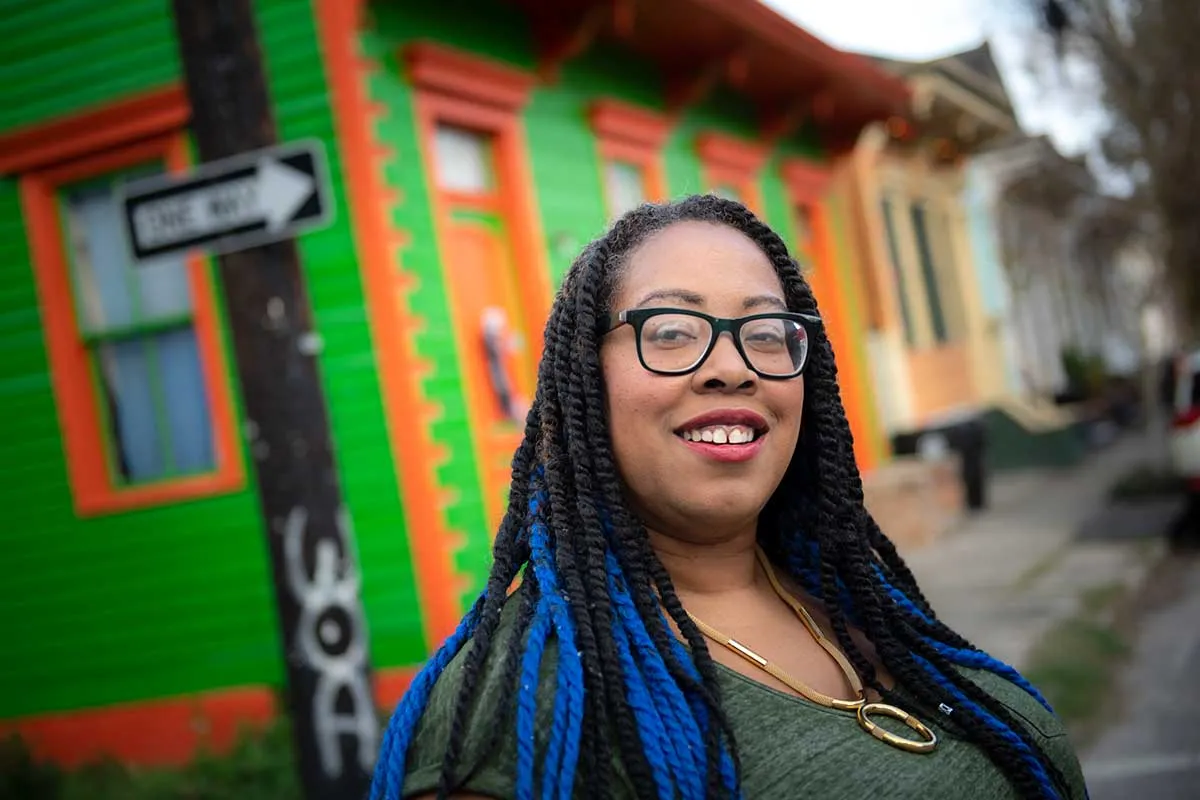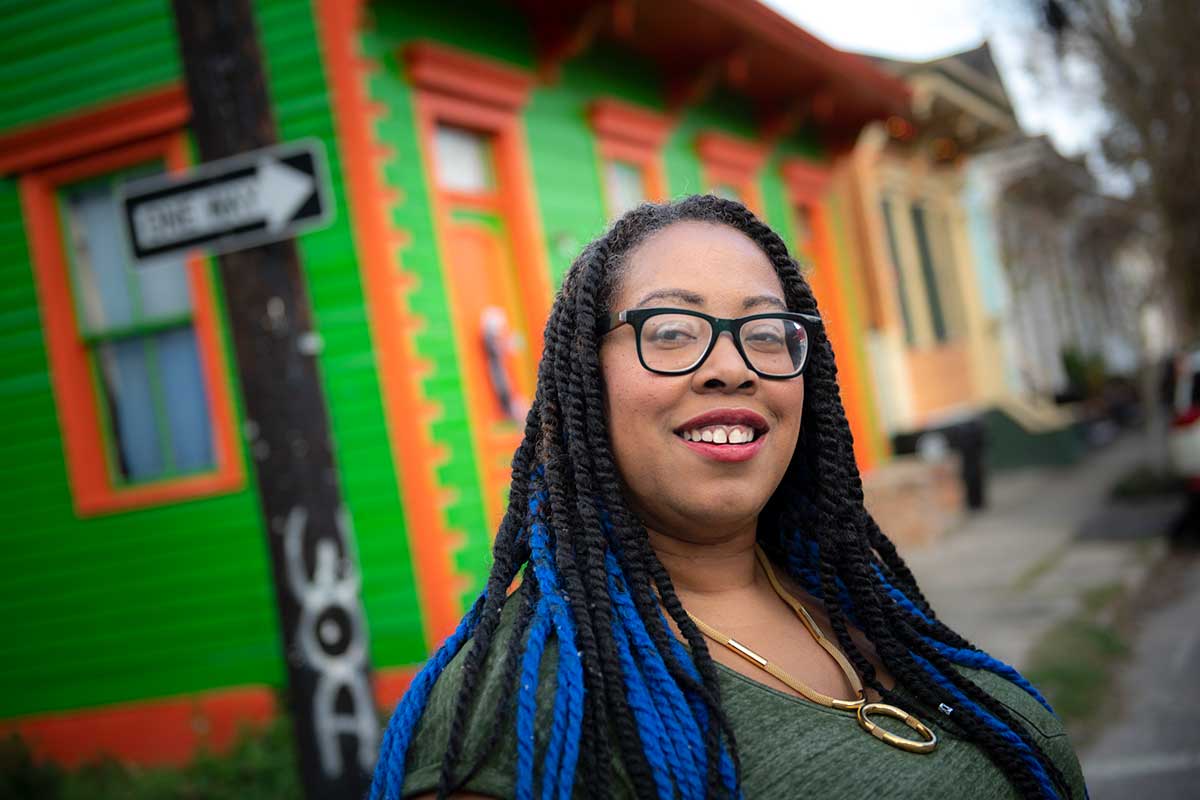

It was the end of 2014, and I needed to do a real intake of my life. I was living in my hometown, New York City, and I had hit a wall. I was steadily working on an enviable amount of film freelance jobs, a difficult feat to pull off in this competitive industry, but was beyond exhausted. At that time, I knew I wanted to teach more, to take fewer soul-sucking money jobs, to continue my life’s work of creating media about underrepresented communities, and to live in a place where people valued and appreciated the importance of joy, rest, and self-care. So, with my production company, TuckerGurl Inc., I took the plunge and moved to New Orleans.
When I told film industry people that I was moving to New Orleans, they would often say, “Oh, there’s so much film happening there now.” I would reply with excitement but honestly, I did not know how this perceived boom in film work in Louisiana would affect me directly. My company’s biggest client was Black Public Media, an arm of public television, where I am the Co-Executive Producer for their documentary series “AfroPoP.” That project could be done from anywhere but it was not enough income to hold me for the year. Part of my rationale for moving was a desire to make more fiction projects, especially feature length films. I knew that large studio films like Jurassic Park 3 or series like NCIS: New Orleans filmed in the city but they weren’t exactly posting job listings for independent film directors. I had to dig deeper to understand what these film incentives meant for me.
Louisiana’s film tax credit program has been around since 2002. In layman’s terms, having this program means that productions at a certain price point can get benefits, also called incentives, for filming in Louisiana. States have become production hubs entirely because of incentives, with Georgia and Louisiana at the top of the list creating a new regional hub called “Hollywood South.” In Louisiana, these incentives include filmmakers getting back 30% of what they spend in the state. For larger projects, this can add up to a return of millions of dollars. Obviously, this money has to come from somewhere—in 2019, the state of Louisiana shelled out $150 million toward film tax incentives alone–and for a state as poor as ours, having incentives this extensive, does not come cheap. However, the influx of crewmembers and actors brings increased revenue to local businesses throughout the city.
I quickly learned that these incentives would benefit me in ways I wouldn’t have imagined working in New York City. Even though I was not working on these larger features, my peers were. This steady work allowed me to easily find crew and collaborators who had outlets to earn regular income. The arrival of studio films and television shows has created what Governor John Bel Edwards called in a recent industry event a “creative class:” a group of people that can remain in Louisiana making a living while pursuing their own passion projects. I’ve been able to meet other independent filmmakers quickly because of New Orleans’ size and culture, and groups like Film Fatales and organizations like the New Orleans Film Society and the New Orleans Video Access Center have allowed me to create a community with invaluable friendships. Most filmmakers get jobs because of referrals and so the more people you know, the better.
What a bigger investment in the Southern film industry and an increased interest in Southern stories have made clear is that the film industry has a growing interest in regionalism. Documentary funders have started the charge by creating new programs like Tribeca Film Institute’s If/Then Short Documentary Program, which specifically funds filmmakers based in underserved regions like the South or the Midwest so they’re able to make short documentaries that are distributed on major platforms like The New York Times’ website or PBS. These funders see the importance of having work made by people living in these regions. Independent feature filmmaking is slowly following suit but there is still a tendency to use places like New Orleans as a studio space instead of making stories that are specific to the region. Vicki Mayer, a professor in the School of Liberal Arts Department of Communication, attests to this in her book Almost Hollywood, Nearly New Orleans: The Lure of the Local Film Economy, observing that the influx of film-making in New Orleans has “created a para-industry predicated on the city’s malleability as a canvas.”
But many of us are trying to change that. Now armed with an incredible community of filmmaking collaborators, I too am working to create local New Orleans stories in partnership with makers who are indigenous to this community. I have found a new quality of life that allows for more rest and focus. I have been able to make a feature length film, “All Styles,” currently available on Amazon, and also make three short films, one of which, All Skinfolk Ain't Kinfolk, premiered on PBS’ Reel South in April, while beginning to teach in Tulane’s Digital Media Practices Program. I know this doesn’t sound restful but trust me, it is!
After six years in New Orleans, I have seen more and more filmmakers and small studios bring their film projects to the city and increasingly hire local crew and talent in more decision-making positions. I have a deeper understanding of the complicated and beautiful history of my new city and, therefore, am able to tell richer and complex stories about it. However, until the larger film industry directly funds and distributes more work by born-and-raised Louisiana makers, we still have a long way to go in creating an industry that benefits everyone equally.
Update: I wrote this piece before COVID-19 was in our midst. As the world struggles with how to handle reopening, the film community is doing the same. This summer I was supposed to direct a feature length fiction film that has been postponed. As of now, there are no answers, but every filmmaker knows that people are hungry for content. I remain optimistic that regional stories that have a strong point of view and are grounded will still be desirable to the filmgoing public. I know the New Orleans film community will weather this, but I also know that none of us will be the same.

